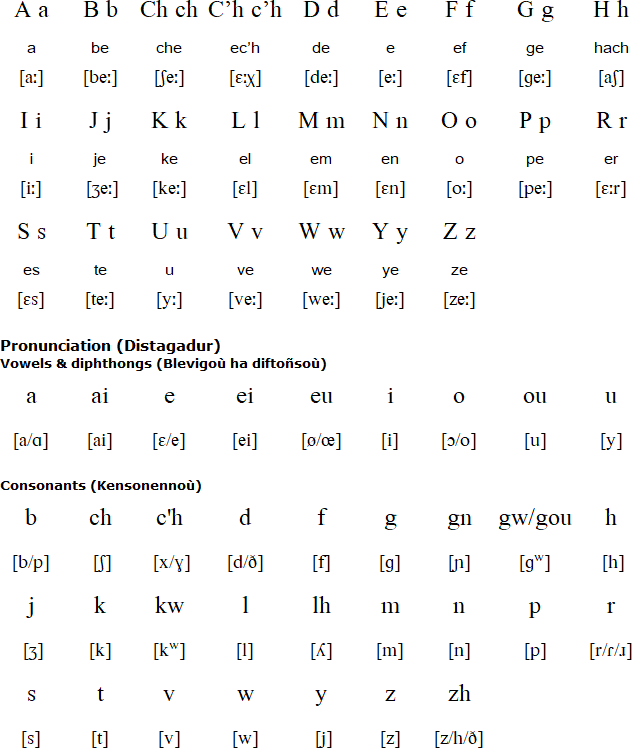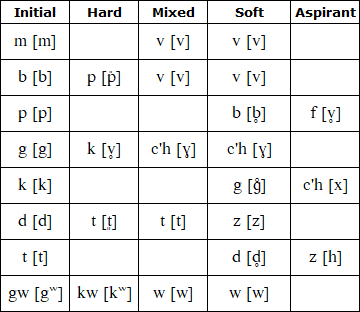Breton is a Celtic language spoken mainly in Brittany (Breizh) by about 206,000 people (in 2013), about 35,000 of whom speak use it as an everyday language. It is spoken mainly in western parts of Brittany, and is also spoken, to some extent, in parts of eastern Brittany, and by Breton immigrants in other parts of France, and in other countries.
[top]
The area known to the Romans as Armorica was renamed Brittany ("Little Britain") after the people who migrated there from Britain, particularly from Cornwall, in the 6th century AD.
Between 1880 to the middle of the 20th century, Breton was banned from schools and children were punished for speaking it. This changed in 1951 with the promulgation of the Deixonne law, which allowed for the Breton language and culture to be taught for one to three hours a week in public education if the teacher is willing and able to do so. Since then a number of schools and colleges have been set up providing either education through the medium of Breton or bilingual Breton/French education.
[top]
Breton first appeared in writing in 6th century AD in an inscription in the sarcophagus of King Waroch / Guérech 1st. The inscription reads Irha Ema in ri (Here lies the king). The equivalent in modern Breton would be amañ emañ ar roue [source].
A manuscript entitled le manuscrit de Leyde, a botanical treatise in Breton and Latin dating from 590 AD is the earliest known example of Breton being used in a longer text. The first printed text in Breton, a passion play, made its appearance in 1530. In the 19th century there was a revival of Breton literature and it continues to flourish today.
For most of its history there was considerable variation in the spelling of Breton. Then in 1908 the orthography of three Breton dialects, Kerneveg (Cornouaille), Leoneg (Leon) and Tregerieg (Tregor), was unified. The other dialect, Gwenedeg (Vannetais), was not included in this reform, but was included in the orthographic reform of 1941.
[top]
There are four traditional dialects of Breton which correspond to medieval bishoprics rather than to linguistic divisions. They are Leoneg in the county of Léon, Tregerieg in the county of Trégor, Kerneveg in Cornouaille, and Gwenedeg in Vannes. The dialects form a dialect continuum varying only slightly from one village to the next.
[top]
Breton can be heard on a number of radio stations for a few hours a week and there is a weekly one-hour TV programme in Breton. There are also a number of Breton language weekly and monthly magazines.
[top]
Breton is closely related to Cornish and less closely related to Welsh, though these languages are not mutually intelligible. Breton has also absorbed quite a lot of vocabulary from French, Latin, and probably from Gaulish languages, which are now extinct.
Breton is also distantly related to Irish, Manx and Scottish Gaelic.
[top]

Many letters have different pronunciations in different dialects of Breton. You can find out more on:
http://en.wikipedia.org/wiki/Breton_language#Pronunciation_of_the_Breton_alphabet

* G disappears before w or ou, e.g. e wele (his bed), but e c’harzh (his garden).
Download an alphabet chart for Breton (Excel)
[top]
Dieub ha par en o dellezegezh hag o gwirioù eo ganet an holl dud. Poell ha skiant zo dezho ha dleout a reont bevañ an eil gant egile en ur spered a genvreudeuriezh.
All human beings are born free and equal in dignity and rights. They are endowed with reason and conscience and should act towards one another in a spirit of brotherhood.
(Article 1 of the Universal Declaration of Human Rights)
Information about Breton | Phrases | Numbers: Modern Breton, Middle Breton, Old Breton | Family words | Colours | Time | Weather words | Comparison of Celtic languages | Celtic cognates | Celtiadur | Tower of Babel | Breton courses on: Amazon.com and Amazon.com
Information about Brittany and the Breton language
http://en.wikipedia.org/wiki/Breton_language
http://www.bretagnenet.com/scb/frame.html
http://www.breizh.net/icdbl/saozg/endangered.htm
http://www.kervarker.org/en/whatisbreton_02_noid.html
http://www.gwalarn.org
Online Breton lessons
http://www.skolober.com
https://www.loecsen.com/fr/cours-breton
http://www.edubreizh.com
http://hizivandeiz.free.fr/loadnevez/240.htm
https://desketa.bzh
Breton, Celtiberian, Cornish, Cumbric, Gaulish, Irish, Lepontic, Lusitanian, Manx, Scottish Gaelic, Welsh
Languages written with the Latin alphabet
Page last modified: 27.06.24
[top]
You can support this site by Buying Me A Coffee, and if you like what you see on this page, you can use the buttons below to share it with people you know.

If you like this site and find it useful, you can support it by making a donation via PayPal or Patreon, or by contributing in other ways. Omniglot is how I make my living.
Note: all links on this site to Amazon.com, Amazon.co.uk
and Amazon.fr
are affiliate links. This means I earn a commission if you click on any of them and buy something. So by clicking on these links you can help to support this site.
[top]
Shipping time world-
wide is typically 6 days.